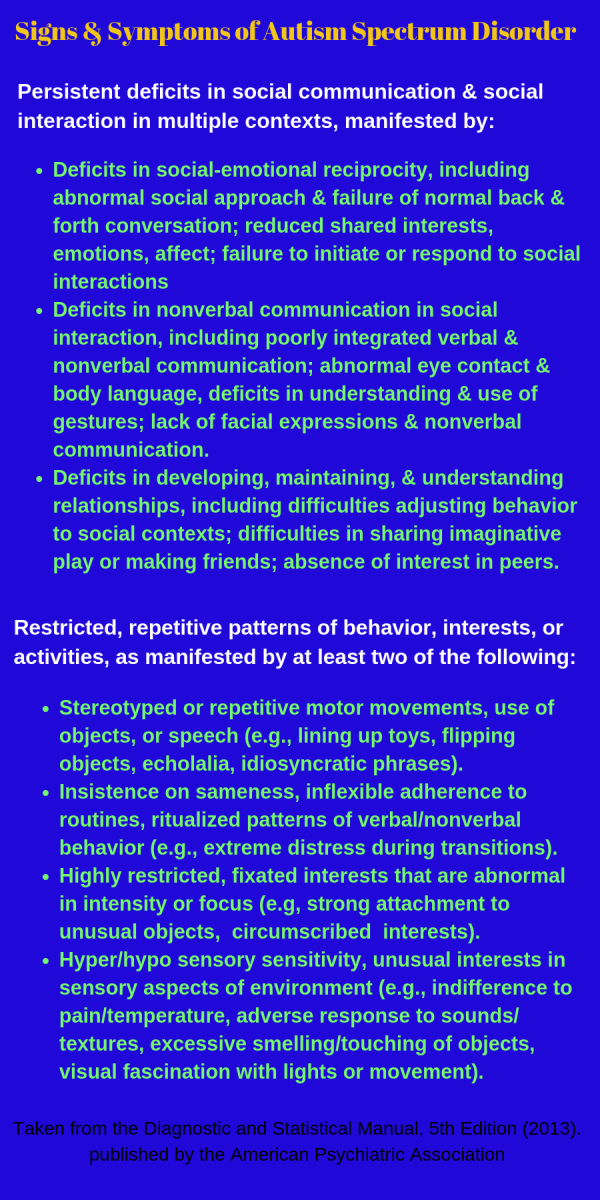There has been increased awareness in recent years regarding autism. The condition is becoming better understood among those who are neurotypical, thanks in part to certain television shows such as Atypical and The Good Doctor. At the same time, the media cannot express the wide variety of ways that Autism Spectrum Disorders present or how they are experienced by the individual with the disorder and those in their life.
Because of this there are still a number of myths and misconceptions about autism that continue to be believed by many people. You’ve probably heard a lot of beliefs and ideas about autism. It’s important to make sure that these thoughts are accurate to decrease the stigma associated with the disorder and increase the respect with which these individuals are treated.
Myths and Misconceptions About Autism
Myth: People with autism can’t feel or express any emotion—happy or sad.
There is a stereotype that people with autism can’t experience or express emotions. It’s may be true that individuals with autism don’t necessarily display emotion in ways that those without the disorder can recognize. However, having autism doesn’t prevent someone from being able to feel the same emotions others feel. It just leads people to communicate emotions differently.
Some of this problem may result from the difficulty many people with autism have in being able to identify and describe their own emotions. This condition is called alexithymia. It is found in about 10 percent of the general population and 50 percent of those with autism spectrum disorders.
Myth: People with autism can’t understand the emotions of others.
Another stereotype about autism is that those with the disorder can’t understand, or process other people’s emotions. Autism can affect the ability to comprehend non-verbal communication. This may make it difficult for them to detect emotions for examples sadness or feelings of dejection based only on body language or tone of voice for example. However, when emotions are more clearly and directly communicated, people with autism are often able to understand, and feel and communicate empathy for others. This reflects the fact that most people with autism are capable of connecting to others emotionally and forming meaningful relationships.
Myth: People with autism are intellectually disabled.
Often times, autism brings with it just as many exceptional abilities as challenges. Many people with autism have normal to high IQ’s and some may excel at math, music or another pursuit.
This is a controversial topic. Many people believe that most people with autism are intellectually disabled. However, taking a look at what this means leads to questions about determining how accurate this assumption is. Intellectual disabilities or limitations in functioning are generally believed to exist when someone has an IQ test score below 70, reflecting two standard deviations below what would be expected compared to their same age peers.
However, there are a few problems with this when attempting to evaluate those with autism. When testing someone, they are required to interact with the evaluator, follow directions and answer questions. There are also specific skills they are required to demonstrate, some with time limits. Many individuals with autism spectrum disorders either have not learned these skills or due to their unique way of expressing themselves and their social issues, they may not give the expected responses. At times they may demonstrate behavior problems when placed in situations in which demands are being made of them. So when they do not answer a question it is unclear if they truly do not no the answer or if they are simply not providing it due to other challenges they have.
Another major problem involves the test itself. If the test was not standardized using individuals with disabilities, in particular autistic spectrum disorders, valid conclusions could not be made. Comparing a child with autism to others based solely on age will obviously not provide a meaningful picture of their actual intellectual level.
Adaptive functioning should be considered when evaluating intellectual impairment along with factors that may negatively influence testing such as familiarity with the tester and conducting the evaluation somewhere that comfortable for the individual. New diagnostic criteria for intellectual disability emphasize clinical judgement along with standardized intelligence testing. Less importance is placed on the IQ score, and there is no longer a “cut-off” score.
It is important to recognize that when individuals with autism are provided effective intervention and programming that their IQ score can increase by dozens of points. This suggests that when those with autism are able to participate in the test that they can more effectively express their actual abilities. At the same time it is always a question as to whether there are still areas they are not capable of responding to in a manner that allows for proper assessment.

Myth: Autism only affects children.
The truth is that children with autism grow up to become adults with autism. Autism spectrum disorders are typically life long conditions although early identification and intervention can make these conditions less problematic. This can make it seem like children with autism no longer experience it as an adult.
The degree to which the day to day functioning of those with autism is compromised in adulthood depends on the severity of the case, amount and type of intervention received, and a number of other factors such as social support and resources available. While some adults with autism fail to develop the skills necessary to live independently, many people with autism earn degrees, get jobs and learn to function well in society.
Myth: Autism is the result of bad parenting.
Back In the 1950s, there was a theory that autism was caused by what they called
“refrigerator mothers.” According to the hypothesis these mothers were cold and uncaring and generally lacking in emotional warmth for their children. This theory has long been disproved and autism has come to be recognized as having strong biological determinants.
Myth: Autism is caused by vaccines.
In recent years there has been a lot of concern that autism spectrum disorders may be caused by childhood vaccinations. However, studies have demonstrated that there is no link between any childhood vaccine and increased risk for developing autism. One vaccine ingredient that has specifically examined is thimerosal, a mercury based preservative used in multi-dose vaccines. Research shows that thimerosal does not cause autism spectrum disorders. Since 2003 nine studies funded or conducted by the CDC found no relationship between vaccines containing thimerosal and autism spectrum disorders. They also found no relationship between these disorders and any ingredient in the vaccine for measles, mumps, and rubella (MMR).
Myth: All individuals with autism have savant abilities.
Savant skills are characterized by a remarkable talent in one or more area such as music or memory. These talents and skills are considered to far exceed the individual’s general level of intellectual or developmental functioning. Sometimes they may also be extraordinary in relation to the general population without autism including those with skills in similar areas. Some other areas of savant ability include:
- Art
- Hyperlexia (extreme advanced reading ability, often accompanied by similarly advance spelling and writing skills)
- Mechanical or spatial skill
- Calendar calculation
- Mathematical calculation
- Athletic performance
- Computer ability
Many people believe savant syndrome to be a defining characteristic of autism. This misconception was strongly influenced by Dustin Hoffman’s portrayal of an autistic man in the movie, Rain Man. While there is a higher prevalence of savant abilities among those with autism than is found in the general population, only about 1 in 10 people with autism exhibit savant abilities.
Myth: Special diets can cure autism
Autism spectrum disorder is a complex neurological disorder with no known cure. In an effort to help their children, parents may try alternative treatments without empirical support such as restrictive diets for example ones that prohibit gluten or casein. Although parents may report that these efforts provided relief from symptoms for their children, these results were likely the result of the diet addressing something other than their autism. There is currently no support for the belief that special diets can be used in isolation to treat or cure autism.
Research has shown that diet does not affect the severity of autism or contribute to permanent improvement of autism symptoms. Individuals with autism may have digestive problems or food allergies like others, which may need to be addressed with changes in diet. They may also have food aversions due to texture, color, smell, or taste which lead to more pronounced behavior problems.
At the same time, it’s important to recognize that with all children it is important to ensure they are eating a nutritious, balanced diet for their overall health and for the difference this makes in their ability to learn, manage their emotions and mood and process information.

Take Away
It’s important to understand the reality about autism and its impact on the individual and those who are important in their life. When we increase awareness about autism spectrum disorders we can decrease harmful stereotypes that can serve to seriously hurt individuals with these disorders as well as their loved ones. Increased knowledge about autism can help families, health practitioners, educators and others who are in frequently in contact with children better identify possible signs of the disorder at an early age leading to early intervention and a better quality of life.

